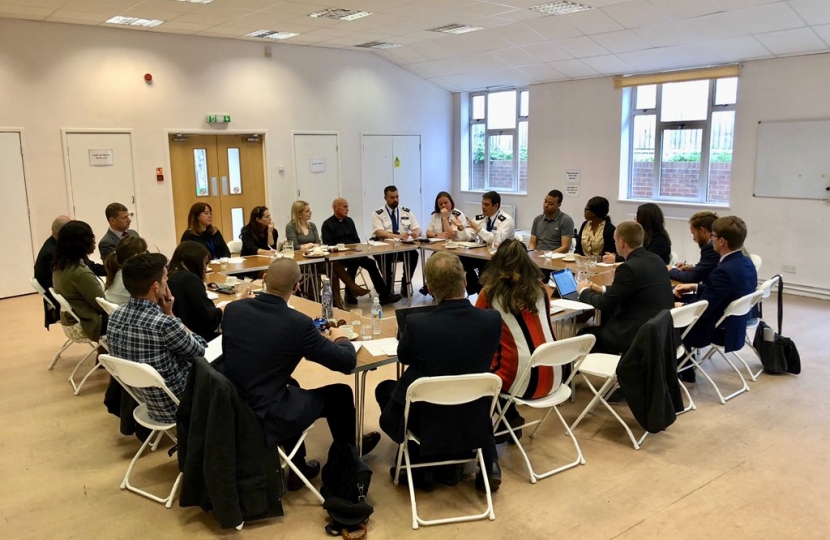
In June, I hosted a meeting in Harold Hill with key local stakeholders including police, parents, charities, schools and council to discuss how we could all work together to reduce and prevent youth violence.
A write-up of the meeting can be found by clicking here.
In case residents are interested in some of the follow-up actions to that meeting, I have pasted below the update my office sent to those stakeholders who attended.
Dear All,
Further to our discussion last month, I wanted to update you on some of the matters raised in the meeting.
During our discussion a key theme was the sharing of information between Police and relevant stakeholders to ensure that joined-up working may take place. Julia had written to Home Office Ministers to enquire further on the provision of training for the Police National Computer system for local authorities, and also on requirements for the Police to check and share information regarding knife crime suspects/witnesses/victims educational status as raised by teachers. I have attached to this email a copy of the response we received from the Minister for Crime, Safeguarding and Vulnerability.
Within her comments, the Minister has advised further on the £100m Serious Violence Fund announced in March that was discussed by both Julia and the Borough Commander at the meeting. This money is being used to pay for additional operational activity and data improvements on knife crime and serious violence. The Metropolitan Police has been allocated £20.84m of this funding and has been allocated a further £7m to establish Violence Reduction Units (VRUs). VRUs are designed to foster a multi-agency approach and as such initial funding applications require sign-off from the Chief Constable, the local authority and health commissioners.
With regard to the specific queries we raised on data sharing. The Minister has advised of a recent announcement by the previous Home Secretary that the Government would seek to bring forward legislation for a new legal duty on public bodies to prevent and tackle serious violence as well as amendments to the Crime and Disorder Act 1998 to ensure this is an explicit priority for Community Safety Partnerships. The measures that the Government intends to implement will create the conditions for public bodies to share intelligence and collaborate to bring solutions to serious violence. Further information on the new public duty can be found at - https://www.gov.uk/government/news/new-public-health-duty-to-tackle-serious-violence
We had enquired specifically on requirements for the Metropolitan Police to share information with education partners and the Minister has advised that there is no such statutory requirement. It has been suggested that this is something best discussed further with the local Police force and partners - would officers be able to advise whether such protocols could be established locally?
We had also enquired on the provision of training for local authority partners on the Police National Computer (PNC) system, something attendees had advised had been provided at Hendon previously. The Minister has advised that the PNC system will soon be replaced by the Law Enforcement Data Service (LEDS) which will provide police and other agencies current and joined-up information. Police forces will make their own decisions regarding training requirements for LEDS.
Finally, the Minister has also advised of teaching resources provided to schools for use in PHSE lessons on knife crime. Please do feel free to remind colleagues of these materials via any local networks you may be part of.
In addition to writing to Home Office Ministers, Julia also wrote to the Mayor of London to ask that the Mayor’s Office for Policing and Crime look into the issues raised during our meeting; the need for police officers to be embedded at schools, improved data sharing and liaison between police, council and schools when a child has been a victim of or perpetrator of crime. Julia had also asked that the Mayor advise of progress in the Metropolitan Police’s recruitment drive for additional officers to our BCU, something we hope will be bolstered further by the new Prime Minister’s recruitment drive of 20,000 additional officers nationally. We have not yet received a response from the Mayor of London however this will be shared with you once received.
Also discussed at the close of the meeting, was the potential presence of Redthread and their youth violence intervention programme, which seeks to engage with young people involved in knife crime during what they term a ‘teachable moment’ i.e. when they are in hospital care themselves following an incident, at Queen’s Hospital. Upon further investigation, Redthread only embed their own staff within the Major Trauma Centres and the North East London quadrant is covered by the Royal London Hospital. However, they do also operate a network, the Hospital-based Interrupting Violence Exchange (HIVE), through which other hospitals that have a violence reduction programme or those that are considering starting one, may share best practice and queries with colleagues.
Julia has highlighted the HIVE programme with the Chief Executive of the Barking, Havering and Redbridge NHS University Trust (BHRUT) and I am pleased to advise that he agreed that this is something they should look into, raising the matter with the Executive Director and the Emergency Department. We look forward to further information on this in due course.
I hope that this update is helpful to you, please let me know if there are any further specific queries we may assist with.
Office of Julia Lopez MP

